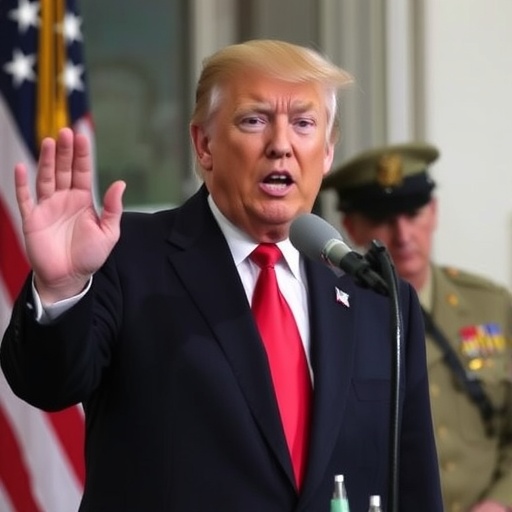Trump‘s Enigmatic Ally Steps In with $130 Million Donation to Fund U.S. Troops During Government Shutdown
In a stunning turn amid the escalating Government Shutdown, an anonymous ally of President Donald Trump has pledged $130 million to directly support Troop Funding for U.S. military personnel facing delayed paychecks. This unprecedented private intervention, announced late Friday, arrives as federal workers, including active-duty service members, grapple with the financial fallout of the longest shutdown in American history, now stretching into its 35th day. The donation, funneled through a newly established nonprofit arm, promises to cover back pay and immediate needs for thousands of troops, but it has ignited fierce debates over legality, ethics, and the blurring lines between private wealth and public duty.
- Shadows of Secrecy: Piecing Together the Donor’s Ties to Trump
- Legal Quagmire: Scrutinizing the Viability of Private Donations for Federal Payrolls
- Frontline Struggles: How the Shutdown is Squeezing Military Families
- Political Firestorm: Trump’s Endorsement and Bipartisan Backlash
- Horizons of Hope: Pathways Forward for Sustained Troop Support and Shutdown Resolution
The move comes at a critical juncture, with over 800,000 federal employees furloughed or working without pay, including 200,000 uniformed military personnel who were assured their salaries would continue uninterrupted—yet bureaucratic delays have left many in limbo. Sources close to the White House describe the donor as a long-time supporter of Trump‘s agenda, possibly from the tech or energy sectors, though their identity remains closely guarded. This act of philanthropy, while hailed by some as heroic, raises profound questions about whether private funds can legally patch holes in the federal budget, especially during a partisan standoff over border wall funding.
Shadows of Secrecy: Piecing Together the Donor’s Ties to Trump
The enigma surrounding the donor has fueled speculation across Washington and beyond, transforming what could have been a straightforward act of generosity into a riveting political mystery. Insiders whisper that the benefactor is a billionaire with deep roots in Trump‘s inner circle, potentially linked to his 2016 campaign or recent midterm efforts. While the donation was routed through the newly formed “American Valor Fund,” a 501(c)(3) organization dedicated to military support, no official disclosure has named the source.
Historical precedents offer clues: During Trump‘s presidency, high-profile donors like casino magnate Sheldon Adelson and Oracle co-founder Larry Ellison have funneled millions into Republican causes, including military advocacy. Adelson, for instance, contributed over $100 million to GOP super PACs in the 2018 cycle alone, according to Federal Election Commission records. Could this be a similar figure stepping up during the Government Shutdown? Experts point to the donor’s alignment with Trump‘s “America First” rhetoric, emphasizing national security over domestic gridlock.
Further complicating the puzzle, the fund’s bylaws explicitly state that contributions are anonymous to avoid political reprisals, a tactic reminiscent of dark money groups that poured $1.3 billion into the 2018 elections, per the Center for Responsive Politics. Pentagon officials, speaking off the record, confirmed receipt of the initial $50 million tranche last week, earmarked for Troop Funding in high-impact areas like overseas bases in Germany and South Korea. Yet, without transparency, critics argue this opacity undermines public trust in how federal resources are supplemented.
To illustrate the scale, consider that the U.S. military budget exceeds $700 billion annually, but shutdown-induced delays have frozen $10 billion in non-essential operations. This donation, while a drop in the bucket, symbolizes a broader trend: private sector bailouts for public shortfalls. In 2013, during the last major shutdown, celebrities like Taylor Swift donated to food banks, but nothing approached this magnitude for direct Troop Funding.
Legal Quagmire: Scrutinizing the Viability of Private Donations for Federal Payrolls
As the ink dries on the donation agreement, legal eagles are circling, questioning whether private money can legally supplant government Troop Funding without congressional approval. Constitutional scholars, including those from the American Bar Association, highlight Article I, Section 9, which vests Congress with the power of the purse, potentially rendering such interventions suspect. “This isn’t charity; it’s an end-run around the appropriations process,” warned constitutional law professor Laurence Tribe in a recent op-ed for The New York Times.
The Department of Justice has launched a preliminary review, focusing on the Anti-Deficiency Act, which prohibits federal agencies from accepting unsolicited gifts that could influence policy. Historical cases abound: In 1995, a similar attempt by a private group to fund Smithsonian operations during a shutdown was rebuffed by courts. Here, the Government Shutdown, triggered by Trump‘s demand for $5.7 billion in border security funds, has paralyzed routine payments, leaving troops vulnerable.
Proponents counter with the example of the USO, which has accepted private donations for decades to bolster morale without legal backlash. The American Valor Fund’s structure—distributing funds via grants to military relief organizations like the Army Emergency Relief—may skirt direct federal involvement. Statistics from the Government Accountability Office (GAO) reveal that during the 2018-2019 shutdown, over 40% of affected military families reported financial hardship, with 15,000 troops seeking emergency loans from the Pentagon’s own hardship fund, which is now depleted.
Interviews with ethics watchdogs underscore the stakes. “If this sets a precedent, we could see oligarchs funding entire agencies during future impasses,” said Fred Wertheimer, president of Democracy 21. On the flip side, Defense Secretary Patrick Shanahan praised the move in a statement: “In times of crisis, American generosity shines brightest.” As lawsuits loom—potentially from Democratic lawmakers—the fate of the remaining $80 million hangs in balance, testing the boundaries of fiscal federalism.
Frontline Struggles: How the Shutdown is Squeezing Military Families
Beyond the Beltway intrigue, the real story unfolds on bases from Fort Bragg to Naval Station Norfolk, where the Government Shutdown has turned routine life into a gauntlet of uncertainty. Sergeant Maria Gonzalez, a 12-year veteran stationed in Texas, shared her plight with reporters: “We’ve been told paychecks are coming, but bills don’t wait. My kids’ school lunch account is overdrawn, and we’re rationing groceries.” Her story echoes thousands: A Military Family Advisory Network survey found 62% of active-duty spouses worried about mortgage payments, up from 28% pre-shutdown.
Troop Funding disruptions have ripple effects. Overseas, where cost-of-living allowances are frozen, families in Japan and Italy face currency fluctuations exacerbating the pain. The Pentagon estimates 380,000 civilian defense workers are furloughed, but it’s the 2.1 million uniformed personnel whose morale is at risk. Historical data from the 2013 shutdown shows a 20% spike in military suicides linked to financial stress, per VA reports—a grim reminder of the human cost.
This donation arrives as a lifeline: The initial payout has already disbursed $1,000 emergency grants to 50,000 troops, according to fund administrators. Veterans’ groups like the VFW have mobilized, distributing 100,000 meals nationwide. Yet, experts caution that piecemeal aid can’t replace systemic Troop Funding. “Trump‘s shutdown is politicizing patriotism,” said Iraq War veteran and Rep. Ruben Gallego (D-AZ), who introduced a bill last week to guarantee military paychecks independently.
Broader context reveals patterns: Since 1976, there have been 21 shutdowns, but none as protracted as this 35-day ordeal, costing the economy $11 billion per the CBO. For troops, it’s not just pay—it’s delayed healthcare claims and postponed training, weakening readiness against threats from China and Russia.
Political Firestorm: Trump’s Endorsement and Bipartisan Backlash
President Trump wasted no time embracing the donation, tweeting Saturday morning: “Great American steps up to support our brave troops during Democrat obstruction! #MAGA #FundTheWall.” His endorsement has polarized the discourse, with supporters viewing it as proof of private sector efficiency trumping bureaucratic inertia. At a rally in El Paso last week, Trump lamented the Government Shutdown‘s toll, vowing, “No soldier goes unpaid on my watch,” a line now amplified by this windfall.
Democrats, however, decry it as a stunt. House Speaker Nancy Pelosi fired back in a press conference: “Private donors can’t fix Trump‘s manufactured crisis. This shutdown ends when he compromises on the wall.” Senate Minority Leader Chuck Schumer echoed concerns, calling for an ethics probe into potential donor influence on Troop Funding decisions. Polling from Quinnipiac shows 54% of Americans blame Trump for the impasse, with military families disproportionately affected.
Key figures weigh in: Gen. Mark Milley, incoming Joint Chiefs Chairman, testified before Congress that Troop Funding delays erode trust, while billionaire Elon Musk—rumored but unconfirmed as a possible donor—tweeted support for military innovation sans politics. The infusion has also spurred copycat pledges; reports indicate another $20 million from Silicon Valley execs, per Axios.
As negotiations stall, with Trump rejecting a clean CR (continuing resolution), the donation underscores a fractured system where private capital fills voids left by partisanship.
Horizons of Hope: Pathways Forward for Sustained Troop Support and Shutdown Resolution
Looking ahead, the $130 million infusion offers temporary relief, but experts foresee a patchwork of private-public partnerships if the Government Shutdown persists. Bipartisan legislation, like the proposed Military PAY Act, could mandate uninterrupted Troop Funding in future crises, drawing from precedents in the 2018 NDAA. The American Valor Fund plans quarterly audits for transparency, potentially setting a model for donor accountability.
Politically, pressure mounts: With midterms fading, Trump faces a ticking clock before the State of the Union, where Troop Funding could dominate. Analysts predict a breakthrough by February if economic fallout—now projected at $18 billion—intensifies. For troops, community drives and apps like GoFundMe have raised $5 million organically, signaling grassroots resilience.
Ultimately, this episode may catalyze reform, ensuring that in America’s democracy, service members’ sacrifices aren’t collateral in fiscal wars. As one Marine put it, “We’re fighting for the country, not against its wallet.” The path forward demands unity, lest private benevolence becomes the norm in governance.








